Tagebuch
Diary
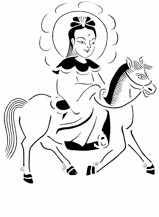
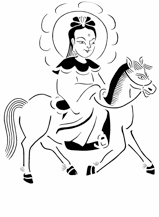

Tagebuch
Diary
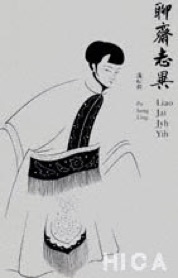
Claudia Wiesner, Felix Wiesner, Hai-Yen Hua und Verena Wiesner
in Vienna, 1983
“The true trial of man is not how he fulfills the role he has inteded for himself, but how he fulfills the one destiny assigns to him.“
This year in May our dear friend Felix M. Wiesner passed away.
He was born on January 22,1920, and died on May 7, 2005, in Zurich, Switzerland.
In each respect he has been an extraordinary person, combining Austrian charme and Swiss profoundness, a deep knowledge of European literature with an intuitive comprehension of the Chinese culture. If you do that, you must be a true freethinker and cosmopolitan!
His lifetime achievement was without doubt his publishing house “Die Waage”, meaning “balance”. He translated and edited classical Chinese literature, which interestingly was very provocative in the Europe of the 50ties. The laudatio held on his 70th birthday gives a deep insight into the immense variety of Felix´s activities.
We will remember him as our friend, intellectual counterpart, shining example and educator.
Eckhard Ströfer
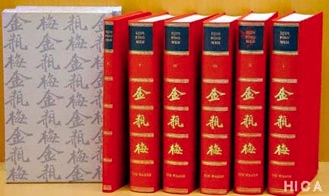
Djin Ping Meh - Blackthorn Blossoms in a Golden Vase
A novel of manners from the Ming-period from the edition of 1755
translated by Otto and Artur Kibat. Two businessmen in China during the time of Wolrd War II. After their return to Germany, they studied Sinology and translated the book, which took more than 30 years. Unfortunately, the brothers didn’t live to witness the publication.
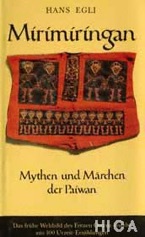

Mirimiringan
Hans Egli 1989
For years Hans Egli has made tape recordings of storytellers on Taiwan and in the Pacific Island countries. The 100 most important and most widespread myths and fairy tales gained by the indigenous people of Paiwan are translated here and brought into a larger context.
The Treatment of Chrysanthemums
German translation by Dr. Gottfried Rösel,1987
80 of more than 500 tales »Nice stories from, about and between this world and the beyond« from the first four books of the collection Liao-dschai-dschi-yi of Pu Sung-Ling (1640-1715). The translation took Rösel 9 years.
Laudatio to the 70th birthday:
Rainer Diedrichs, former director of the Zurich Central Library‘s information and press office; January 22th,1990
On the birthday of the publisher, the second volume of the complete edition of “500 Ghost- and Lovestories“ by Pu Sung-ling appears in 5 volumes. Thus, the second peak of world literature becomes obvious in the context of the extensive library of Chinese novels, which is soon to encompass 20 volumes, after the first complete edition of Djin Ping Meh’s novel in 6 volumes appeared in 1987. There are 3 reasons to proudly retrospect.
Wiesner was born in Vienna in 1920. His mother was a descendant of a K.+ K. officer family of lower nobility. Her father was an infantry general and the director of the war welfare office in Vienna. His father was from a prosperous upper class family from South Austria. His great grandfather was Ferdo Livadic (Livada = Croatian: meadow), a significant musician, who composed the Croatian national anthem besides operas and concerts and who is still honoured today. Wiesner’s grandfather decided to buy himself into Zurich, out of pure love for the tourist region Switzerland. He found himself for the first time listed in the citizens book of Zurich in 1895, together with his wife, 3 sons and one daughter. The oldest son, Edgar, who was to become Wiesner’s father, took this citizenship more seriously than his younger brothers and his sister. In 1906, he entered the military training school and, in 1907, he visited the UO-School in Zurich. In 1914, he marched into the occupation of the border. In 1926, he ventured to flee from the plight of inflation and the crisis in the remaining Austria and to build up a new existence in Zurich. In 1930, he asked his family, his wife and 2 children, to follow him. Felix was 10 years old, when he encountered his until then unknown hometown.
For 2 further years he attended the elementary school, then the Lyceum and the university, where he studied, 10 years on the whole (5 years during the war), first chemistry, then German philology, comparative literature, Russian language, Indian philosophy with Emil Abegg and history of religion. In 1947, he entered the Manesse Publishing House as an editor. From 1950 onwards, he started to work for the publishing houses Arche, Diogenes, Walter, Bucher, Scherz, Ringier a.o., and to tour the Swiss book trade as a sales representative for his own publishing house Die Waage (meaning “balance”). With the commissions earned, he has financed his publishing house until today.
The publishing house „Die Waage“ was founded by Felix M. Wiesner together with the experienced business man C.A. Drenowatz in 1951 as a single firm. The latter’s enthusiasm for Chinese scroll paintings was decisively stirred by Wiesner and has been immortalized in the Rietberg Museum.
The publisher intended Die Waage to be characterized by his own high standards regarding literature and by his worldview and editorial and bibliophilic perfectionism. This couldn’t amount to a large output… The name Die Waage symbolized the programme: in line with the Chinese polarity of Yin and Yang, works of the West and of the East, of the intellectual-rational and of the spiritual-pious world interpretation, were meant to complement each other and to make the fragile harmony of a reformed Taoism shine out. Thus, in our life-threateningly patriarchal one-dimensionality, not subversion was sought for, but rather superversion: emancipation of woman and man, liberation, creativity and always reading enjoyment.
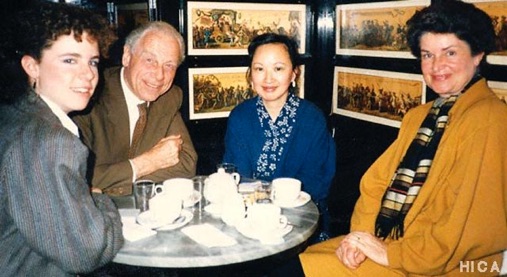
HICA

On January 22th, 1990, Felix M. Wiesner celebrates his 70th birthday. His publishing house Die Waage, which he founded in 1951, enters into its 40th year of existence.
This bold statement met for decades two kinds of opposition: petty-bourgeois morality and angry intolerance in the West, and in the East, Confucian contempt for all enjoyment of reading and of life considering it as a popular impropriety. Both had serious consequences.
The first 4 books of 1952 were in line with the programme: 2 intellectual-rational books: Goethe’s “Reinecke Fuchs“ and Voltaire’s novel “Die Prinzessin von Babylon“ (The Princess of Babylon). 2 books were spiritual-pious: Ernst Benz´s “Russische Heiligenlegenden“ (Russian Acts of the Saints) and the Taoist legend “Blumenzauber“ (Flowermagic). Gradually, 23 Die-Waage-books followed, including 2 especially successful highlights and numerous deluxe editions from private hands.
By the end of the fifties, the second book series of the Chinese novels’ library started spectacularly with the second title in 1959: with the imposed lawsuit and the burning of the entire edition of Jou Pu Tuan in 1961. A second lawsuit, from 1971 to 1974, concerning the novel Dschu-lin Yä-schi, again before the Federal Court, was won, but nevertheless it entered Switzerland’s legal history like the first one, and all lawyers of the country know about it. After 6 years of lawsuits concerning censorship, after experiencing difficult times and loss of money, the publisher found the statement of Jan Palocka confirmed: “The true trial of man is not how he fulfills the role he has inteded for himself, but how he fulfills the one destiny assigns to him.“
The juridical accusation of impropriety against a Buddhist and a Taoist novel of old China revealed how relentlessly serious the ones “high up” took the danger of emancipation from patriarchy and its “values” like the rejection of sexuality and passion. The destructive rage of the censorship office forced the publishing house to a semi-emigration to Hamburg and to an existence in the catacombs in Switzeland for many years.
The gems of worldliterature of the first 10 volumes among the Chinese novels’ library hardly found appreciation among the orientalists, who were usually convinced of Confucianism. This was due to the texts‘ vernacular and mostly anonymous origin. Consequently, the publications hardly found attention from the press. Therefore, the well-tended first editions of Die Waage remained difficult to sell for years. And not until they were issued as cheap licensed- and pocket editions did they reach a high print run and earned further distribution - still without publicity!
The following volumes of Pu Sung-Ling are the Chinese books of the dead, lively and ingeniously narrated. They show us also, in a seductive manner, a way to interpret human life in the open space with regard to death and recurrence, which in turn must be supremely unconventional. Cave inquisitionem!
The exhibition in the central library is meant to document the publisher’s destiny as well as possible. Habent sua fata libelli. Futura latent.
At the beginning of my studies at the University of Zurich in 1975, Professor Wolfram Eberhard, a prominent ethnologist and sinologist of Berkley University, introduced me to his publisher Felix Wiesner. From this time on, a deep friendship with all of his family developed, meanwhile lasting over four generations.
Felix and Vera Wiesener were my teachers, friends and family, who gave me an understanding of the Europan culture and way of life. I owe a deep debt of gratitude and I will always carry them in my heart.
Hai-Yen Hua